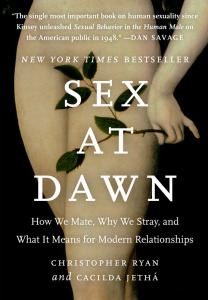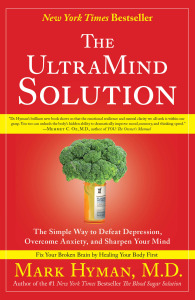Shamelessly inspired by this list of Julien Smith’s. Also check out my lists from 2012 and 2013.
Mainly due to spending an inordinate amount of time on planes and in airports, I easily hit my goal of 20 books again this year. I am trying to alternate between reading non-fiction and more classics, and even added “Read Modern Library’s Top 100 Best Novels” to my bucket list.
Here’s 40 of my favorite takeaways, quotes, and passages from the 20 books I read in 2014 (italicized where taken straight from the author):
—
The Happiness of Pursuit by Chris Guillebeau
1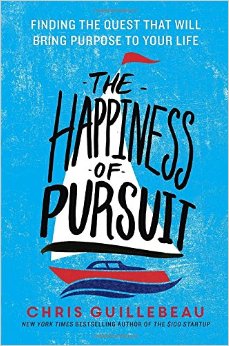 . What people say about an adventure or quest that involves perceived risk:
. What people say about an adventure or quest that involves perceived risk:
Successful outcome: brave, courageous, confident
Failed outcome: stupid, risky, naive, arrogant
2. Research shows we enjoy planning a vacation as much as taking the vacation. Anticipation is a powerful force.
Sex at Dawn by Christopher Ryan and Cacilda Jetha
3. No nonhuman primate [that lives in groups] is monogamous, and adultery has been documented in every human culture studied—including those in which fornicators are routinely stoned to death (Leviticus 20:10). In light of all this bloody retribution, it’s hard to see how monogamy comes “naturally” to our species. Why would so many risk their reputations, families, careers—even presidential legacies—for something that runs against human nature? Were monogamy an ancient, evolved trait characteristic of our species, as the standard narrative insists, these ubiquitous transgressions would be infrequent and such horrible enforcement unnecessary. No creature needs to be threatened with death to act in accord with its own nature.
4. Scottish researcher Tony Little found women’s assessment of men as potential husband material shifted if they were on the pill. Little thinks the social consequences of his finding may be immense: “Where a woman chooses her partner while she is on the Pill, and then comes off it to have a child, her hormone-driven preferences have changed and she may find she is married to the wrong kind of man.”
Influence by Robert B. Cialdini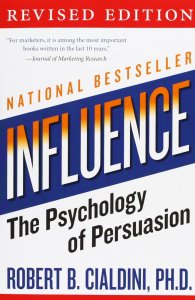
5. Research on elementary school children shows that adults view aggressive acts as less naughty when performed by an attractive child and that teachers presume good-looking children to be more intelligent than their less-attractive classmates.
6. An example of the foot-in-the-door technique is when residents of a town were initially asked by volunteers to accept and display a three-inch “be a safe driver” sign (a trifling request) on their doors. Two weeks later, volunteers asked them to put up a lawn sign and had good compliance. Importantly, this technique worked just as effectively when the first request was related to state beautification, not driver safety at all — signing the beautification petition changed the view these people had of themselves. They saw themselves as public-spirited citizens who acted on their civic principles. There is internal pressure to bring self-image into line with action. There is an external pressure to adjust image according to the way others perceive us.
Talk Like Ted by Carmine Gallo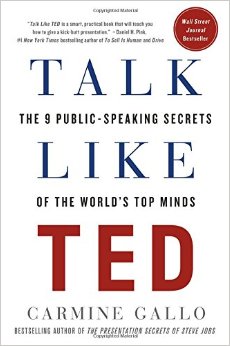
7. If you can’t explain your big idea in 140 characters or less, keep working on your message.
8. Scientists have produced a mountain of evidence showing that concepts presented as pictures instead of words are more likely to be recalled. Put simply, visuals matter—a lot. If you hear information, you are likely to remember about 10 percent of that information three days later. Add a picture, however, and your recall rate will soar to 65 percent. To put that into context, a picture will help you remember six times more information than listening to the words alone.
The UltraMind Solution by Mark Hyman
9. Depression is not a Prozac deficiency. The real problem with conventional medical training is that doctors are not trained to be healers, but to be pharmacologists (except for surgeons). This problem is a direct consequence of the myth of diagnosis. We are trained to name the disease, and then assign a medication to treat it.
10. The unique combination of all your genes combined with the toxic environment in which you live makes you sick. Our environmental influences pull the trigger and cause sickness. If you had those genes but lived in a more pristine time without toxins, you would likely not get sick. Each one of us is susceptible. Some of us break down at very low level of toxicity–like those with autism or Parkinson’s, they are the yellow canaries warning the rest of us that something is wrong with the “air”.
The Subversive Copy Editor by Carol Fisher Saller
11. Style rules aren’t used because they’re “correct”. They’re used for your convenience in serving the reader.
12. Stet (or “let it stand” in Latin) on an edited paper tells the writer to ignore an edit.
Steal Like an Artist by Austin Kleon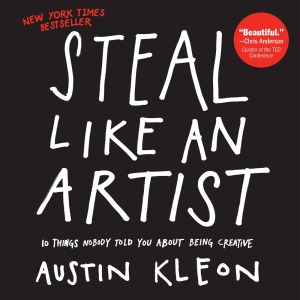
13. All advice is autobiographical.
14. There is a kind of fallout that happens when you leave college. The classroom is a wonderful, if artificial, place: Your professor gets paid to pay attention to your ideas, and your classmates are paying to pay attention to your ideas. Never again in your life will you have such a captive audience. This is actually a good thing, because you want attention only after you’re doing really good work. There’s no pressure when you’re unknown. You can do what you want. Experiment. Do things just for the fun of it. When you’re unknown, there’s nothing to distract you from getting better. No public image to manage. No huge paycheck on the line. No stockholders. No e-mails from your agent. No hangers-on. You’ll never get that freedom back again once people start paying you attention, and especially not once they start paying you money. Enjoy your obscurity while it lasts. Use it.
Zero to One by Peter Thiel
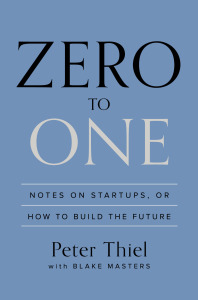 15. Creative monopolists give customers more choices by adding entirely new categories of abundance to the world. Creative monopolies aren’t just good for the rest of society, they’re powerful engines for making it better. Even the government knows this: that’s why one of its departments works hard to create monopolies (by granting patents to new inventions) even though another part hunts them down (by prosecuting antitrust cases). It’s possible to question whether anyone should really be awarded a legally enforceable monopoly simply for having been the first to think of something like a mobile software design. But it’s clear that something like Apple’s monopoly profits were from designing, producing, and marketing the iPhone were the reward for creating greater abundance, not artificial scarcity: customers were happy to finally have the choice of paying high prices to get a smartphone that actually works.
15. Creative monopolists give customers more choices by adding entirely new categories of abundance to the world. Creative monopolies aren’t just good for the rest of society, they’re powerful engines for making it better. Even the government knows this: that’s why one of its departments works hard to create monopolies (by granting patents to new inventions) even though another part hunts them down (by prosecuting antitrust cases). It’s possible to question whether anyone should really be awarded a legally enforceable monopoly simply for having been the first to think of something like a mobile software design. But it’s clear that something like Apple’s monopoly profits were from designing, producing, and marketing the iPhone were the reward for creating greater abundance, not artificial scarcity: customers were happy to finally have the choice of paying high prices to get a smartphone that actually works.
16. Like acting, sales works best when hidden. This explains why almost everyone whose job involves distribution–whether they’re sales, marketing, or advertising–has a job title has nothing to do with those things. People who sell advertising are called “account executives.” People who sell customers work in “business development.” People who sell companies are “investment bankers.” And people who sell themselves are called “politicians.” There’s a reason for these redescriptions: none of us wants to be reminded that we’re being sold.
20 Something Manifesto by Christine Hassler 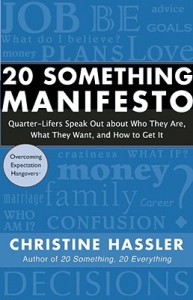
17. A twenty something is someone who is constantly evaluating and analyzing his or her life and continually coming up with the answer “I don’t know.”
18. “It isn’t what I want to do forever, but it feels right, right now.” If you can say this, then 9 times out of 10 you are doing the right thing, and you shouldn’t worry about what’s next until you can’t say this honestly anymore. So many twenty somethings that are perfectly content but feel pressure to figure out their next move.
The Millionaire Next Door by Thomas J. Stanley and William D. Danko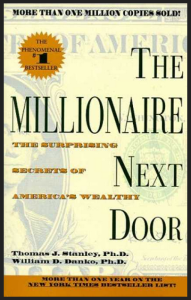
19. Seven common denominators upon those who accumulate wealth:
1. They live well below their means
2. They allocate their time, energy, and money efficiently, in ways conducive to building wealth.
3. They believe that financial independence is more important than displaying high social status.
4. Their parents did not provide economic outpatient care.
5. Their adult children are economically self-sufficient.
6. They are proficient in targeting market opportunities.
7. They chose the right occupation.
20. To build wealth, minimize your realized (taxable) income and maximize your unrealized income (wealth/capital appreciation without a cash flow).
 One Hundred Years of Solitude by Gabriel Garcia Marquez
One Hundred Years of Solitude by Gabriel Garcia Marquez
21. In old Colombia, if it felt good: fuck it. Even if it is your aunt or sister.
22. I want to name my dog/kid/something Melquíades one day.
Flow by Mihaly Csikszentmihalyi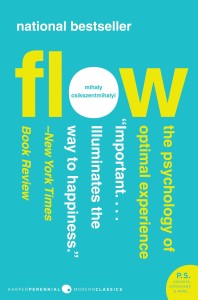
23. Enjoyment appears at the boundary between boredom and anxiety, when the challenges are just balanced with the person’s capacity to act.
24. The essence of socialization is to make people dependent on social controls, to have them respond predictably to rewards and punishments. And the most effective form of socialization is achieved when people identify so thoroughly with the social order that they no longer can imagine themselves breaking any of its rules. One must particularly achieve control over instinctual drives to achieve a healthy independence of society, for as long as we respond predictably to what feels good and what feels bad, it is easy for others to exploit our preferences for their own ends.
The Adventures of Johnny Bunko by Daniel Pink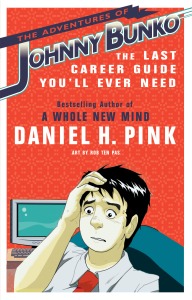
25. You can do something for instrumental reasons–because you think it’s going to lead to something else, regardless of whether you enjoy it or it’s worthwhile. Or you can do something for fundamental reasons–because you think it’s inherently valuable, regardless of what it may or may not lead to. And the dirty little secret is that instrumental reasons usually don’t work. Things are too complicated, too unpredictable. You never know what’s going to happen. So you end up stuck. The most successful people — not all of the time, but most of the time — make decisions for fundamental reasons. They take a job or join a company because it will let them do interesting work in a cool place — even if they don’t know exactly where it will lead.
26. “What’s the most powerful force in the universe? Compound interest. It builds on itself. Over time, a small amount of money becomes a large amount of money. Persistence is similar. A little bit improves performance, which encourages greater persistence, which improves performance even more. And on and on it goes. Lack of persistence works the same way — only in the opposite direction. … The world is littered with talented people who didn’t persist, who didn’t put in the hours, who gave up too early, who thought they could ride on talent alone. Meanwhile, people who might have less talent pass them by. … That’s why intrinsic motivation is so important. The more intrinsic motivation you have, the more likely you are to persist. The more you persist, the more likely you are to succeed.”
Animal Farm by George Orwell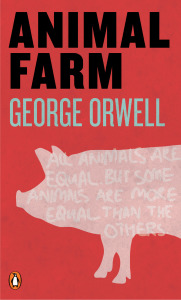
27. Farm animals should not be allowed to unionize.
28. Read a classic book that you missed out on in high school and it’s damn-near guaranteed you will hear or read some sort of reference to it the week following that you wouldn’t have picked up on before.
Breakfast of Champions by Kurt Vonnegut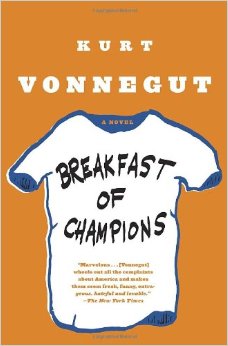
29. “We are healthy only to the extent that our ideas are humane.”
30. Want to be an entertaining writer? Strip everything in the world down to the most basic elements you can, and voila.
Purple Cow by Seth Godin 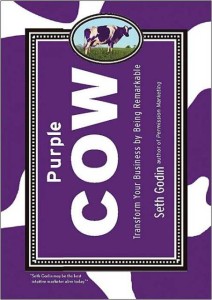
31. Most companies are so afraid of offending or appearing ridiculous that they steer far away from any path that might lead to this result. They make boring products because they don’t want to be interesting. When a committee gets involved, each well-meaning participant sands off the rough edges, speaking up for how their constituency might not like the product. The result is something boring and safe.
32. In your career, even more than for a brand, being safe is risky. The path to lifetime job security is to be remarkable.
A Whole New Mind by Daniel Pink 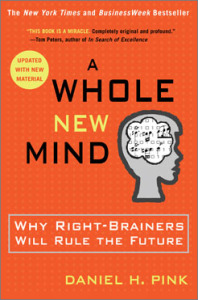
33. Last century, machines proved they could replace human backs. This century, new technologies are proving they can replace human left brains. Management meta-guru Tom Peters puts it nicely, saying that for white collar workers “software is a forklift for the mind.” It won’t eliminate every left-brain job. But it will destroy many and reshape the rest. Any job that depends on routines–that can be reduced to a set of rules, or broken down into a set of repeatable steps–is at risk. If a $500/month Indian chartered accountant doesn’t swipe your comfortable accounting job, Turbo-Tax will.
34. There are three types of beings–those who create culture, those who buy culture, and those who don’t give a shit about culture. Move between the first two.
A Farewell to Arms by Ernest Hemingway
35. Catherine Barkley is one of the more annoying characters in literature I have ever read.
36. The dialogue between Frederic and Count Greffi is some of the best I have ever read.
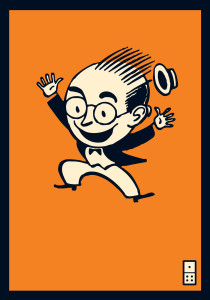 Poke the Box by Seth Godin
Poke the Box by Seth Godin
37. We reward those who draw maps, not those who follow them.
38. The original Starship Enterprise was conceived by Matt Jefferies. It looked like a cross between a frisbee and a can opener. Clearly wrong. But Matt had the drive to deliver. He took the wrong start and revised and improved and innovated until the Enterprise we know and love came to be. The hardest part, it seems to me, was the first one, the wrong one. Poking doesn’t mean right. It means action.
Lexicon by Max Barry 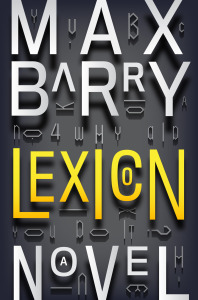
39. There are (mostly) no squirrels in Australia.
40. “I just think it’s missing the point to get upset about bias in Fox News or MSNBC or whoever. I see this all the time: I mention to someone that I watch Fox and it’s like I just slaughtered a baby. They ask how I can watch that, it’s just propaganda, etc etc. And they know this not because they’re ever sat down and spent any time with it but because their favourite news channel, i.e. a Fox competitor, sometimes plays a clip from a Fox show and it makes Fox look really stupid.
Well, you know what, Fox does that, too. If I only watched Fox, I’d think you must be really stupid, watching that other show I see clips from on Fox sometimes.
But I don’t just watch Fox, because the way to beat biased reporting isn’t to find the least biased one and put all your trust in that. First of all, they’re all biased, from the language they use and the framing down to the choice they make about which stories to report. The gap between the most biased news show and the least is pretty small, all things considered.
But more importantly, relying on a single source of information means you can’t critically evaluate it. It’s like you’re locked in a room and every day I come in and tell you what’s happening outside. It’s very easy for me to make you believe whatever I want. Even if I don’t lie, I can just tell you the facts that support me and leave out the one’s that don’t.
That’s what’s happening if you’re getting all your news from one place. If you stop listening to someone the second you hear a word or a phrase you’ve been taught belongs to the enemy, like “environment” or “job creators,” that’s what you’re doing. You might be an intelligent person, but once you let someone else filter the world for you, you have no way to critically analyse what you’re hearing. At best, absolute best case scenario, if they blatantly contradict themselves, you can spot that. But if they take basic care to maintain an internal logical consistency, which they all do, you’ve got nothing. You’ve delegated the ability to make up your mind.”


